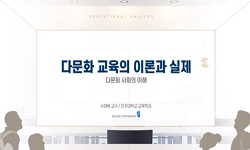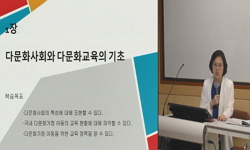The dramatic demographic shift in Korea is more apparent in the schools than anywhere else. But this change in the racial, cultural, and linguistic diversity of the student population is not the problem. The problem lies in the way teachers have respo...
http://chineseinput.net/에서 pinyin(병음)방식으로 중국어를 변환할 수 있습니다.
변환된 중국어를 복사하여 사용하시면 됩니다.
- 中文 을 입력하시려면 zhongwen을 입력하시고 space를누르시면됩니다.
- 北京 을 입력하시려면 beijing을 입력하시고 space를 누르시면 됩니다.

다문화 교육을 위한 일반교육 교사와 특수교육 교사 간 역량 비교 분석 : 다문화교육 거점 초등학교를 중심으로 = The Comparison of Teacher’s Competence on Multicultural Education between General Education Teachers and Special Education Teachers
한글로보기부가정보
다국어 초록 (Multilingual Abstract)
The purpose of this study was to investigate the teacher’s competence including experience, belief, attitude, knowledge, and self-efficacy on multicultural education. For this purpose, a total of 143 elementary school teachers in the both general and special classes participated in this survey. The survey was composed four sub-categories: experience, attitude, outcome expectancy belief, and efficacy. The major results of this study could be summarized as follows: First, the special teachers had fewer experience on multicultural education than the general teachers. Second, There were no differences in the levels of attitude and efficacy between the two groups. Third, the special teachers showed relatively higher level of outcome expectancy belief than the general teachers. Fourth, the both of special and general teachers showed higher scores in the outcome expectancy belief than self-efficacy. In the final part of this article, discussions and several implications on the multicultural education related with special education were provided.
The dramatic demographic shift in Korea is more apparent in the schools than anywhere else. But this change in the racial, cultural, and linguistic diversity of the student population is not the problem. The problem lies in the way teachers have responded to that change. Concurrently multicultural education scholars have become persistent in their arguments that teachers should become knowledgeable that about cultural diversity and develop pedagogical skills and attitudes to teach these students.
The purpose of this study was to investigate the teacher’s competence including experience, belief, attitude, knowledge, and self-efficacy on multicultural education. For this purpose, a total of 143 elementary school teachers in the both general and special classes participated in this survey. The survey was composed four sub-categories: experience, attitude, outcome expectancy belief, and efficacy. The major results of this study could be summarized as follows: First, the special teachers had fewer experience on multicultural education than the general teachers. Second, There were no differences in the levels of attitude and efficacy between the two groups. Third, the special teachers showed relatively higher level of outcome expectancy belief than the general teachers. Fourth, the both of special and general teachers showed higher scores in the outcome expectancy belief than self-efficacy. In the final part of this article, discussions and several implications on the multicultural education related with special education were provided.
국문 초록 (Abstract)
본 연구는 다양한 문화적 배경을 가진 학생을 포함하여 모든 학생을 위한 다문화교육을 실시하는데 있어 특수교육 교사가 어느 정도의 역량을 갖추고 있는지 알아보기 위해 실시하였다. 이...
본 연구는 다양한 문화적 배경을 가진 학생을 포함하여 모든 학생을 위한 다문화교육을 실시하는데 있어 특수교육 교사가 어느 정도의 역량을 갖추고 있는지 알아보기 위해 실시하였다. 이를 위해 전국의 다문화교육 거점학교로 지정된 105개 초등학교에 재직 중인 일반교육 교사 68명과 특수교육 교사 75명이 연구에 참여하였으며, 다문화교육에 대한 경험, 관점, 태도, 성과기대, 교사효능감으로 구성된 다문화교사역량 설문에 응답하였다. 교사들의 응답을 분석한 결과는 다음과 같다. 첫째, 특수교육 교사의 다문화교육이나 다문화가정 학생과 관련된 경험은 몇몇 항목에서 일반교육 교사에 비해 적은 것으로 나타났다. 둘째, 특수교육 교사와 일반교육 교사는 다문화교육 목적에 대한 관점과 다문화교육과 관련된 태도, 교사효능감에서 차이를 보이지 않았다. 셋째, 특수교육 교사가 일반교육 교사보다 다문화교육을 위한 교사역할에 대해 높은 성과기대를 갖고 있는 것으로 나타났다. 넷째, 두 교사 집단은 대체로 다문화교육에서의 교사역할에 대한 성과기대가 교사효능감보다 높게 나타났다. 이상의 연구결과를 토대로 향후 특수교육에서 다문화교육과 다문화가정 학생에 대한 접근을 어떻게 해야 할 것인지에 대해 논의하였다.
목차 (Table of Contents)
- Ⅰ. 서론
- Ⅱ. 연구방법
- 1. 연구 참여자
- 2. 설문지 개발
- 3. 설문지 발송 및 회수
- Ⅰ. 서론
- Ⅱ. 연구방법
- 1. 연구 참여자
- 2. 설문지 개발
- 3. 설문지 발송 및 회수
- 4. 자료 분석
- Ⅲ. 연구결과
- 1. 다문화교육 및 다문화가정 학생에 대한 경험 분석
- 2. 다문화교육 목적에 대한 관점에서의 차이 분석
- 3. 다문화교육에 대한 태도, 성과기대, 교사효능감에서의 교사 집단 간 차이 분석
- 4. 다문화교육에 대한 태도, 성과기대, 교사효능감 순위 분석
- Ⅳ. 논의
- 참고문헌
- ABSTRACT
동일학술지(권/호) 다른 논문
-
장애아동 및 통합교육에 대한 독일 예비교사들의 태도에 관한 연구
- 이화여자대학교 특수교육연구소
- 김기흥
- 2012
- KCI등재
-
- 이화여자대학교 특수교육연구소
- 박빛나
- 2012
- KCI등재
-
고등학교 점자사회교과서 시각자료 점역의 표현 형식과 정도 및 적절성 분석
- 이화여자대학교 특수교육연구소
- 이경림
- 2012
- KCI등재
-
반성적 저널쓰기를 활용한 특수학급 현장실습이 예비특수교사의 교사효능감에 미치는 영향
- 이화여자대학교 특수교육연구소
- 최승숙
- 2012
- KCI등재




 RISS
RISS DBpia
DBpia







